Latest Analysis and Commentary
by Lawrence A. Franklin • September 12, 2025 at 5:00 am
The Trump administration will likely pressure Sharaa's regime not to threaten Syria's Kurds, who make up a large portion of the pro-US Syrian Democratic Army in northeast Syria. Sharaa might also have to count on the US to resist pressure from his benefactor Turkey, which may be urging him to target Syria's Kurds. The question, however, remains if Sharaa is actually doing all he can to "protect all minorities" as he promised, or did Saudi Arabia's Crown Prince Mohamed bin Salman, in pressuring US President Donald Trump to give Sharaa a chance to govern, set Trump up? Is Sharaa truly on a path to joining the Western alliance, or is he really just a terrorist in a suit and tie?

Is Syria's new ruler, Ahmed al-Sharaa, actually doing all he can to "protect all minorities" as he promised, or did Saudi Arabia's Crown Prince Mohamed bin Salman, in pressuring US President Donald Trump to give Sharaa a chance to govern, set Trump up? Is Sharaa truly on a path to joining the Western alliance, or is he really just a terrorist in a suit and tie? Pictured: Sharaa is greeted by jihadists of his Hayat Tahrir al-Sham group, at the Umayyad Mosque in Damascus on December 8, 2024. (Photo by Abdulaziz Ketaz/AFP via Getty Images)
One of the most unheralded geopolitical developments in the Middle East, following Israel's military victories over regional enemies, is Israel's diplomatic reaction to the new regime of Ahmed al-Sharaa (aka Abu Mohammad al-Jolani) in Syria. Recent meetings in Paris between high-level Israeli and Syrian diplomats have reportedly resulted in a de-escalation of tensions as well as in establishing significant security improvements for Israel along its border with Syria.
Continue Reading Article
by Robert Williams • September 11, 2025 at 5:00 am
The report also shows that the EU runs a highly sophisticated "EU media complex" through which it gets to shape media narratives about itself and its agendas. The European Commission has, it seems, has literally paid off almost everything and everyone in the media world -- meaning that everyone, from news agencies to media outlets, public broadcasters and other media organizations, sits in the pocket of the European Commission to greater or smaller degrees. These abundant examples of media and news organizations are just those within the EU. The EU, however, is also operating a large-scale influence operation outside of the EU.... There is nothing transparent about any of this funding. According to the report, it is opaque and difficult to uncover. "The EU's ever-expanding system of media financing...creates financial dependencies, incentivises narrative conformity and fosters an ecosystem in which dissenting voices are marginalised – all under the virtuous banners of 'fighting disinformation', 'promoting European values' and 'building a European public sphere'" — Thomas Fazi, "Brussels's media machine: European media funding and the shaping of public discourse," June 2025. The EU sadly appears to be a deeply corrupt and undemocratic regime, which desperately clings to power through influence-peddling and the imposition of heavy-handed censorship. Hundreds of millions of Europeans continue to put up with these tactics. When will they please wake up?

The unelected leadership of the evidently corrupt European Union (EU) is now paying mainstream media to promote the agendas of its EU "elites." The EU appears to have spent as much as 1 billion euros during the past decade alone in the process. (Image source: iStock/Getty Images)
The unelected leadership of the evidently corrupt European Union (EU) is now paying mainstream media to promote the agendas of its EU "elites." The EU appears to have spent as much as 1 billion euros during the past decade alone in the process, according to a recent report, "Brussels's media machine: European media funding and the shaping of public discourse," by Thomas Fazi, from the European think tank MCC Brussels. Framing the projects as "fighting disinformation" and "promoting European integration" the EU has been throwing taxpayer money, conservatively estimated at €80 million annually, to "media projects" -- not including indirect funding, such as advertising contracts. The report also shows that the EU runs a highly sophisticated "EU media complex" through which it gets to shape media narratives about itself and its agendas. According to Fazi's report:
Continue Reading Article
September 11, 2025 at 4:00 am

(Photo by Andrew Harnik/Getty Images)
They were trying to stop you, Charlie. You lived what America is about. We shall love and miss you forever. All of us at Gatestone
by Anna Mahjar-Barducci • September 10, 2025 at 5:00 am
Sudan's brutal civil war... is not just a clash between the Sudanese Armed Forces (SAF) and their former military allies turned rivals, the Rapid Support Forces (RSF). It is a calculated power grab by the Muslim Brotherhood, which appears to be using the SAF as a Trojan horse to dominate northeast Africa and the Red Sea, a critical artery for global commerce. The Muslim Brotherhood, sponsored by Qatar, appears to be hijacking the SAF to stage a takeover, recycling old alliances under new guises. Despite recent concessions to the United States and Egypt, the Muslim Brotherhood's grip in Sudan -- backed by Qatar and Iran -- threatens regional and global stability, potentially including freedom of passage in the Red Sea. [T]he Muslim Brotherhood — known in Sudan as the Islamic Movement — has entrenched itself in the SAF, and turned it into a tool for their regional ambitions to take control of northeast Africa and the Red Sea. The Muslim Brotherhood is not just allied with the SAF; individuals in it seem to be steering the SAF to take total control of Sudan in order to make it the Muslim Brotherhood's stronghold in Africa and the Middle East. The SAF is infiltrated by jihadist factions such as the Al-Bara Bin Malik Brigade (the Muslim Brotherhood's local military arm), the Bunyan Al-Marsous Brigade, and Justice and Equality Movement rebels led by Finance Minister Jibril Ibrahim. These groups, tied to Bashir's ruthless National Intelligence and Security Service, frame their fight as a "jihad" against the RSF, which is backed by Sudan's secular civil society. Ali Ahmed Karti, the U.S.-sanctioned Islamic Movement leader, is, as reported by Arab media outlets, a key orchestrator of the SAF-Muslim Brotherhood alliance. Since his student days, Karti has organized Brotherhood loyalists in the army, and later packed the SAF with jihadists. One analyst suggested that the five generals were dismissed after Burhan met with U.S. Special Envoy Mossad Boulos in Switzerland, on August 11, 2025. Researcher Mujahid Ahmed, however, warns that the Muslim Brotherhood's influence persists, extending into civilian institutions, especially the foreign affairs and justice ministries. According to the Ayin Network, Al-Burhan apparently still relies on Karti and Bashir's loyalist, Ahmed Haroun, for battlefield support, indicating a tactical, not total, break. Iran has been supplying the Muslim Brotherhood-SAF axis with arms, including Ababil-3 and Mohajer-6 drones, which were delivered to Port Sudan in March and June 2024. Satellite imagery viewed by the BBC confirms their presence at a military site near Khartoum. Iran's support of this Muslim Brotherhood-SAF axis, tied to its ambitions to have a presence in the Red Sea, coincides with the Brotherhood's goals: namely, threatening U.S. allies such as Israel, Saudi Arabia and Egypt. Burhan's "cosmetic" purge of Islamist generals shows that indeed he can be influenced by Egypt and by the United States, but his reliance on the Muslim Brotherhood's financial and military support limits his ability to implement any real reforms. Sudan is evidently very much a part of the Muslim Brotherhood's global agenda. Ignoring events there will only allow a hostile stronghold to emerge in a region strategically vital for the interests of the West.
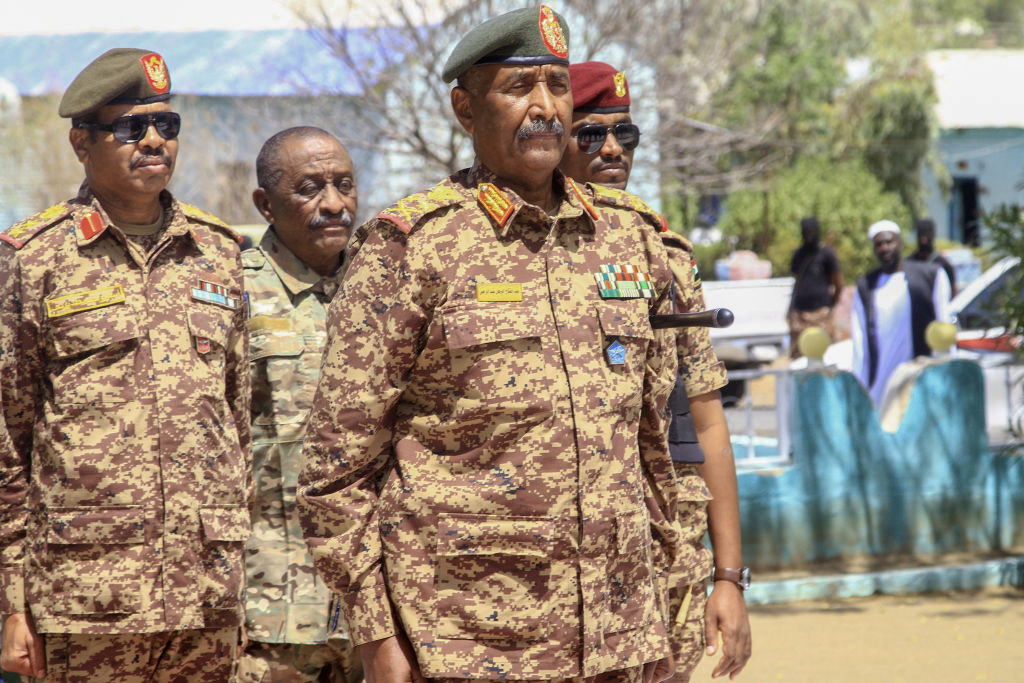
Sudan's brutal civil war is not just a clash between the Sudanese Armed Forces (SAF) and their former military allies turned rivals, the Rapid Support Forces (RSF). It is a calculated power grab by the Muslim Brotherhood. Sudanese Armed Forces leader General Abdel Fattah Al-Burhan's "cosmetic" purge of Islamist generals shows that indeed he can be influenced by Egypt and by the U.S. but his reliance on the Muslim Brotherhood's financial and military support limits his ability to implement any real reforms. Pictured: Burhan in Gedaref State, Sudan, on April 10, 2024. (Photo by AFP via Getty Images)
Sudan's brutal civil war, often overshadowed by global headlines, is not just a clash between the Sudanese Armed Forces (SAF) and their former military allies turned rivals, the Rapid Support Forces (RSF). It is a calculated power grab by the Muslim Brotherhood, which appears to be using the SAF as a Trojan horse to dominate northeast Africa and the Red Sea, a critical artery for global commerce. Despite recent moves by SAF leader General Abdel Fattah Al-Burhan to curb Islamist influence, presumably at the request of the United States or Egypt, the efforts of the Muslim Brotherhood, which has deep roots in his army, to achieve control of Sudan, northeast Africa and the Red Sea, signal a dangerous threat that could disrupt oil supplies, inflate global prices, and revive Sudan as a terrorist hub, imperiling Western interests.
Continue Reading Article
by Lawrence Kadish • September 10, 2025 at 4:00 am

It is important to hear and heed the warning provided by US Army General Jonathan Wainwright, who endured four brutal years as a Japanese prisoner-of-war eight decades ago. Pictured: General Douglas MacArthur embraces liberated POWs Wainwright (R) and British Lieutenant General A E Percival, in Yokohama, Japan on August 31, 1945. (Photo by Keystone/Getty Images)
After watching the carefully stage-managed parade of Communist Chinese military power observing the 80th anniversary of the end of World War II, it is important to hear and heed the warning provided by an American general who endured four brutal years as a Japanese prisoner-of-war eight decades ago. General Jonathan Wainwright fought a brave but futile defense of the Philippines in the days after Pearl Harbor. Having been overwhelmed by far superior forces, his men faced the Bataan Death March and barbaric treatment from their Japanese captors.
Continue Reading Article
by Lawrence A. Franklin • September 9, 2025 at 5:00 am
Pakistan, which possesses nuclear weapons, is nevertheless almost totally dependent on the People's Republic of China for military weapons systems, infrastructure improvement and energy projects. Pakistan is also in debt to China, its largest creditor, to the tune of $29 billion. Without continued Chinese financial assistance, Pakistan would fail to meet scheduled repayments of its international debt, which now amounts to $130 billion. China's financial rescue of its South Asian ally probably saved Pakistan from having the International Monetary Fund (IMF) declare it global credit risk. Such a declaration by the IMF could have resulted in the severe curtailment of foreign investment, as well as to decreased access to additional international loans. Consequently, if this had materialized, even China, might not have been able to stabilize the government of Pakistani Prime Minister Shahbaz Sharif, which already is struggling to survive amidst soaring inflation, a weakening currency, high unemployment and dwindling foreign reserves. China might initially have hoped that Pakistan would serve as a model to attract interest from other states to embrace its Belt and Road Initiative (BRI). China has sponsored 122 BRI projects in Pakistan, and might also have hoped, as with other BRI investments, to create a debt trap for Pakistan, as it has for other nations.... As of 2021, according to The Guardian, "Researchers have identified debts of at least $385bn (£286bn) owed by 165 countries to China for 'Belt and road initiative' (BRI) projects..." Two interconnected flagship projects of China's BRI program in Pakistan significantly threaten to reduce Pakistan's national sovereignty: the "China Pakistan Economic Corridor (CPEC), and the Gwadar Port Facility in Southwestern Pakistan along the coastline of the Arabian Sea.... Both projects appear to serve China's interests more than they do Pakistan's. Pakistan's latest sovereignty-concession is its caving to China's insistence that it improve relations with Afghanistan's Taliban regime.... The TTP's primary objective is to overthrow the government of Pakistan, replacing it with a strict Islamist state. Despite this bloody feud between the Kabul and Islamabad, Beijing has agreed to extend the CPEC BRI project to include Afghanistan. Gwadar is likely eventually to serve as a Chinese naval base, which will help challenge India's prominence in the Indian Ocean. Gwadar also would provide China with increased power projection in the Indo-Pacific Region. China's aggressive intrusion into its permissive ally Pakistan, certainly, violates Beijing's stated "Principle of Non-Interference" that supposedly governs its diplomatic relations. This latest projection of power in the Indian Ocean region is similar to what China has already achieved off the Horn of Africa, with its naval base at Djibouti, and -- take notice, United States and its Latin American allies -- what Communist China could be planning for Peru's new mega-port on the eastern Pacific.

Pakistan, which possesses nuclear weapons, is nevertheless almost totally dependent on the People's Republic of China for military weapons systems, infrastructure improvement and energy projects. Pakistan is also in debt to China, its largest creditor, to the tune of $29 billion. Without continued Chinese financial assistance, Pakistan would fail to meet scheduled repayments of its international debt, which now amounts to $130 billion. Pictured: Chinese-made JF-17 fighter jets of the Pakistan Air Force fly over Islamabad on March 16, 2022. (Photo by Aamir Qureshi/AFP via Getty Images)
Pakistan, which possesses nuclear weapons, is nevertheless almost totally dependent on the People's Republic of China for military weapons systems, infrastructure improvement and energy projects. Pakistan is also in debt to China, its largest creditor, to the tune of $29 billion. Without continued Chinese financial assistance, Pakistan would fail to meet scheduled repayments of its international debt, which now amounts to $130 billion. Pakistan's foreign policy decision-making is also reportedly hostage to Chinese influence. Islamabad has even established joint border security programs with Chinese paramilitary teams, an arrangement that additionally threatens Pakistani sovereignty.
Continue Reading Article
by Khaled Abu Toameh • September 8, 2025 at 5:00 am
Reporters Without Borders also ignored allegations that many of the Palestinian journalists targeted by the Israel Defense Forces were affiliated with Hamas and other terror groups. The silence of the international community has empowered Hamas to get rid of most of its political critics, as well as journalists who dared to criticize the terror group and its leaders. Consequently, the only Palestinian journalists who were free to operate in the Gaza Strip for nearly the past two decades were those working for Qatar's Al-Jazeera (Arabic) television empire, serving as Hamas's unofficial mouthpiece, or those whose reporting was limited to attacking and smearing Israel. Several international news agency journalists received telephone threats and warnings against covering Hamas' suppression of the protests. Those who continue to ignore Hamas atrocities and human rights abuses against Palestinians are doing a great disservice to the Palestinians: they are allowing Hamas to get away with its crimes against its own people.

A global media campaign of more than 150 outlets from 70 countries, coordinated by a group called Reporters Without Borders, pointed an accusing finger at Israel and ignored allegations that many of the Palestinian journalists targeted by the IDF were affiliated with Hamas and other terror groups. Pictured: Reporters Without Borders director general Thibaut Bruttin delivers a speech during a demonstration in Paris, on September 26, 2024. (Photo by Thomas Samson/AFP via Getty Images)
A recent international campaign to express solidarity with Palestinian journalists in the Gaza Strip has pointed an accusing finger at Israel, while ignoring the suffering they have experienced under Hamas's rule during the past two decades. The global media campaign of more than 150 outlets from 70 countries, coordinated by a group called Reporters Without Borders, also ignored allegations that many of the Palestinian journalists targeted by the Israel Defense Forces were affiliated with Hamas and other terror groups. Since its brutal and bloody takeover of the Gaza Strip in 2007, Hamas has been waging a systematic campaign to silence its critics, including journalists who do not toe the line. We have not seen any global protests against Hamas's crackdown.
Continue Reading Article
by Amir Taheri • September 8, 2025 at 4:00 am
The Beijing parade had a much deeper message. Xi presented it as an homage to China's role in "defeating fascism" in World War II, thus, for the first time, joining the narrative that propelled the US, USSR, Britain and China before the Maoist regime, and France into the five leaders of the new world order via the United Nations. Xi is trying to end China's amnesia by reminding his people and the world that China didn't start with the 1949 Maoist outburst. He is trying to reclaim China's place as a major power, whether we like it or not. It is up to others to see it as a rival, a competitor, a partner or an enemy.
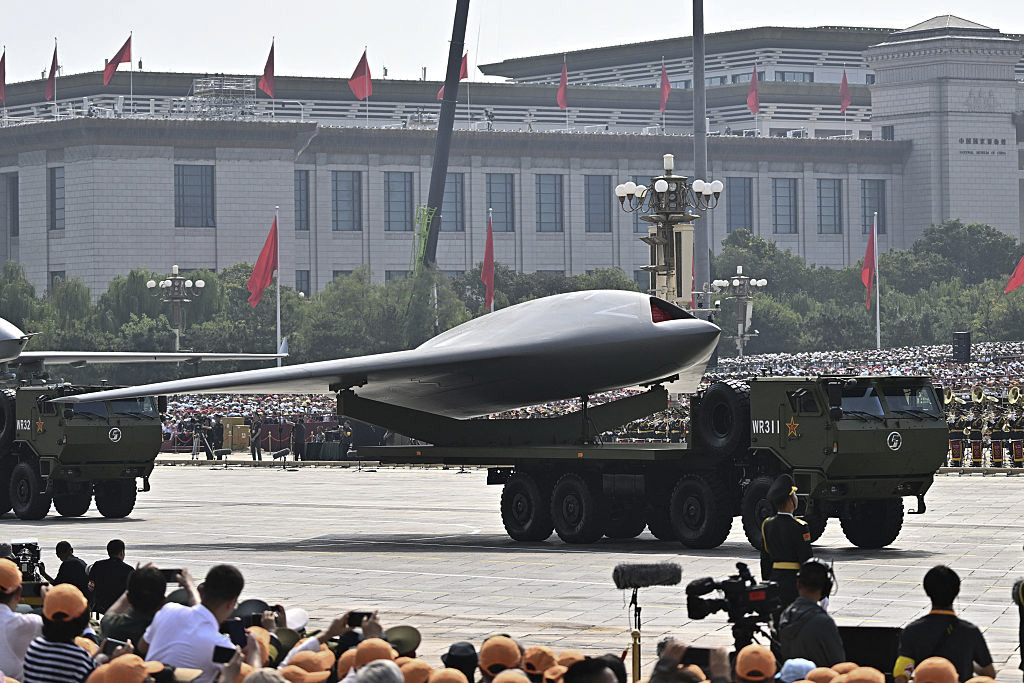
With last week's military parade, Chinese President Xi Jinping is trying to end China's amnesia by reminding his people and the world that China didn't start with the 1949 Maoist outburst. He is trying to reclaim China's place as a major power, whether we like it or not. Pictured: A CS-5000T drone rolls by during the parade in Beijing's Tiananmen Square on September 3, 2025. (Photo by Pedro Pardo/AFP via Getty Images)
This month, China hit the world headlines with two events that could change the perception of its role and place in the global system in either a negative or positive way. The first event was the summit of the so-called Shanghai Cooperation Organisation (SCO) that brought together heads of state from 10 member nations plus another 10 wannabe members. Russian President Vladimir Putin was among the first category, along with Indian Premier Narendra Modi, his Pakistani counterpart Shehbaz Sharif and a string of Central Asian "stans" plus Iran. Turkish President Recep Tayyip Erdogan and North Korean leader Kim Jun-un were in the second category. Western pundits saw the summit in Tianjin as an attempt at building a rival pole of power to challenge the United States and its European and Japanese allies. They played the old tune of "a new multipolar world system," forgetting that in using the geographical metaphor, one can't have more than two poles.
Continue Reading Article
by Salah Uddin Shoaib Choudhury • September 7, 2025 at 5:00 am
The silencing of Bangladesh's media is not just about censorship -- it is part of a larger transformation of the country into a breeding ground for radical Islamist politics that threatens the stability of the entire region. By criminalizing the press, Yunus is dismantling the very institutions that could hold his interim regime accountable, while empowering Islamist groups that thrive in darkness. Ansar al-Islam, the Bangladeshi franchise of Al-Qaeda, openly justifies murdering secular writers and bloggers by branding them "enemies of Islam." Yunus's reliance on Islamist allies such as Jamaat-e-Islami undermines this role by pushing Bangladesh into a trajectory that will likely make it hostile to US interests. If Bangladesh descends further into authoritarianism and Islamist radicalization, it risks becoming another Afghanistan -- a sanctuary for extremist groups with transnational ambitions. Washington cannot afford to remain silent while an unelected regime dismantles democracy and silences the media in Bangladesh. Yunus has promised elections in February 2026, but his Islamist allies are already signaling their intention to sabotage the process. If the media remains silenced, if journalists remain in prison, the path is clear: Bangladesh will be robbed of its democracy and its people robbed of their voice. Bangladesh stands at a dangerous crossroads. The persecution of journalists under Yunus is not merely an assault on freedom of expression - it is the deliberate dismantling of democracy itself. Every day that Monjurul Alam Panna and other journalists remain behind bars, Bangladesh moves closer to becoming another Taliban-ruled Afghanistan. If Yunus's regime is not challenged now, Bangladesh will not just lose its democracy -- it will proceed to export instability across South Asia.
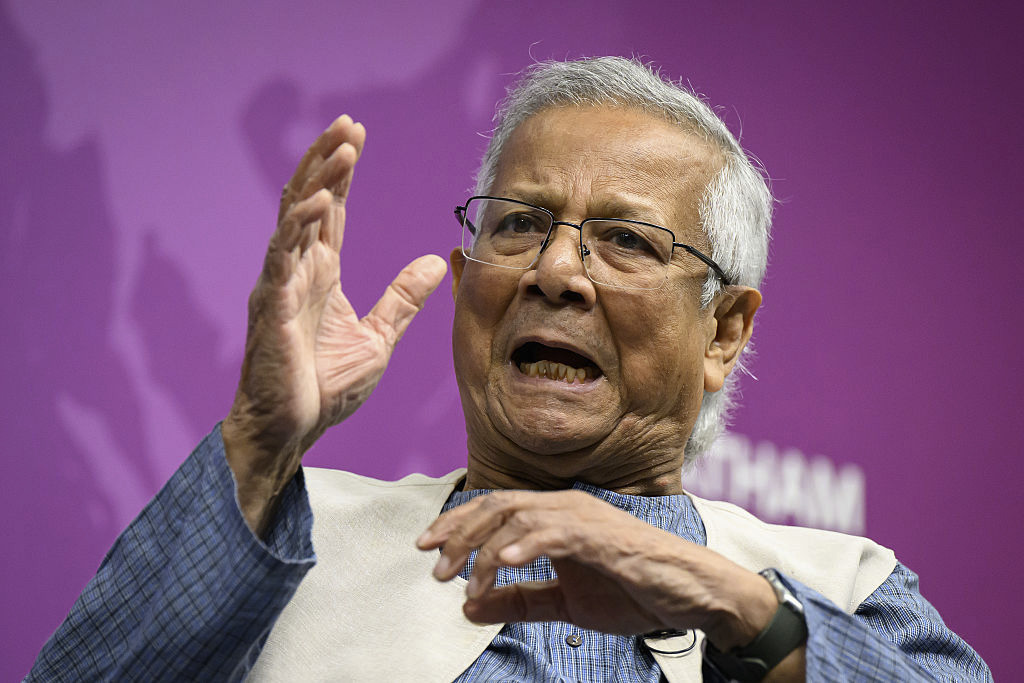
Since the Islamist-backed coup of 2024 that installed Muhammad Yunus in power, Bangladesh has witnessed an unprecedented assault on freedom of the press. Journalists have been dragged to jail under trumped-up charges, assaulted in courtrooms, and criminalized under the vague Anti-Terrorism Act. Pictured: Yunus speaks on June 11, 2025 in London, United Kingdom. (Photo by Leon Neal/Getty Images)
For years, Turkey's President Recep Tayyip Erdoğan has been synonymous with the brutal silencing of dissent, turning his country into one of the world's largest prisons for journalists. Today, shockingly, Bangladesh -- once hailed as a moderate Muslim democracy -- is following the same dangerous path under the unelected, military-backed rule of Nobel laureate Muhammad Yunus. Since the Islamist-backed coup of 2024 that installed Yunus in power, the country has witnessed an unprecedented assault on freedom of the press. Journalists have been dragged to jail under trumped-up charges, assaulted in courtrooms, and criminalized under the vague Anti-Terrorism Act. The once vibrant Bangladeshi media, long known for its resilience, is now suffocating under a regime that increasingly mirrors Taliban-style authoritarianism.
Continue Reading Article
by Majid Rafizadeh • September 6, 2025 at 5:00 am
Investigations revealed that the IRGC had employed intermediaries in Australia, including organized crime networks, to carry out these attacks, demonstrating the regime's continuing reliance on proxies to pursue its hostile objectives abroad. From the 1980s onward. Iran has been implicated in multiple deadly attacks against American troops in Lebanon, killing hundreds of U.S. diplomats and military personnel, all carried out by Hezbollah under Tehran's guidance. The Iranian regime also had a role in the September 11, 2001 attacks on the US. In 2018, a U.S. federal court ruling determined that Iran provided material support to Al-Qaeda in the period leading up to and following the 9/11 attacks, resulting in a multibillion-dollar judgment for the families of the victims. [I]t is difficult to understand why some international actors have advocated for engagement, negotiation or sanctions relief with Iran. Diplomatic overtures and economic incentives have not only failed to curb the regime's aggressive behavior; they have emboldened it. Closing Iranian embassies and consulates, expelling diplomats, and halting trade with Iran -- and especially secondary sanctions: banning trade with countries that trade with Iran -- would disrupt its operations, curb its influence, and send a message that the regime's pattern of aggression and antisemitism will not be tolerated.

Closing Iranian embassies and consulates, expelling diplomats, and halting trade with Iran -- and especially secondary sanctions: banning trade with countries that trade with Iran -- would disrupt its operations, curb its influence, and send a message that the regime's pattern of aggression and antisemitism will not be tolerated. Pictured: Iran's Ambassador to Australia Ahmad Sadeghi (L) walks toward his car at the Islamic Republic of Iran's Embassy in Canberra on August 27, 2025, a day after Australia ordered him expelled from the country. (Photo by Hilary Wardhaugh/AFP via Getty Images)
Iran's deep involvement in antisemitic attacks in Australia should serve as a kick-in-the-head wake-up call to the European Union and the wider international community. Australia made the unprecedented decision to expel the Iranian ambassador, Ahmad Sadeghi, the first such diplomatic action in the country since World War II.
Continue Reading Article
by Salah Uddin Shoaib Choudhury • September 5, 2025 at 5:00 am
In an unprecedented escalation of Islamist persecution, Jamaat-e-Islami — the Bangladeshi ideological offshoot of the Muslim Brotherhood (MB) — has begun imposing the jizya tax on Hindus and other non-Muslims, openly declaring its intent to replace the country's secular democratic framework with Islamic sharia law. Backed by Pakistan's Inter-Services Intelligence, and linked to global jihadist networks, including Al Qaeda, Jamaat-e-Islami's move comes just months after a coup that brought Muhammad Yunus to power, triggering a rapid rise in radical Islamic influence. This development threatens not only Bangladesh's fragile democracy but also poses a strategic security risk to South Asia and the wider free world. In the United States, Jamaat-e-Islami maintains deep ties with the Council on American-Islamic Relations (CAIR) and the Islamic Circle of North America (ICNA). According to the Observer Research Foundation, these organizations have succeeded in securing funding from U.S. federal agencies — particularly USAID, the Department of Agriculture, and the Federal Emergency Management Agency (FEMA). In 2020, Sam Westrop documented in the Middle East Quarterly that millions of federal taxpayer dollars have flowed to US-based Islamist groups with alleged terror connections — a trend that continued even during the first Trump administration: "A variety of other dangerous Islamist groups continue to enjoy government approval and partnership. USAID openly urges Americans to donate to terror-linked charities such as LIFE for Relief and Development..." Under interim head of government Muhammad Yunus, radical Islamist groups have grown emboldened, openly pushing for the transformation of the country into a theocratic state. This vacuum has allowed ISIS and Al-Qaeda to expand their regional presence. Pakistan's Inter-Services Intelligence, seeing a "golden opportunity", has intensified its subversive operations in both Bangladesh and other neighboring countries. This development is not just a domestic issue — it is a warning to the world about the resurgence of militant Islamism in South Asia.
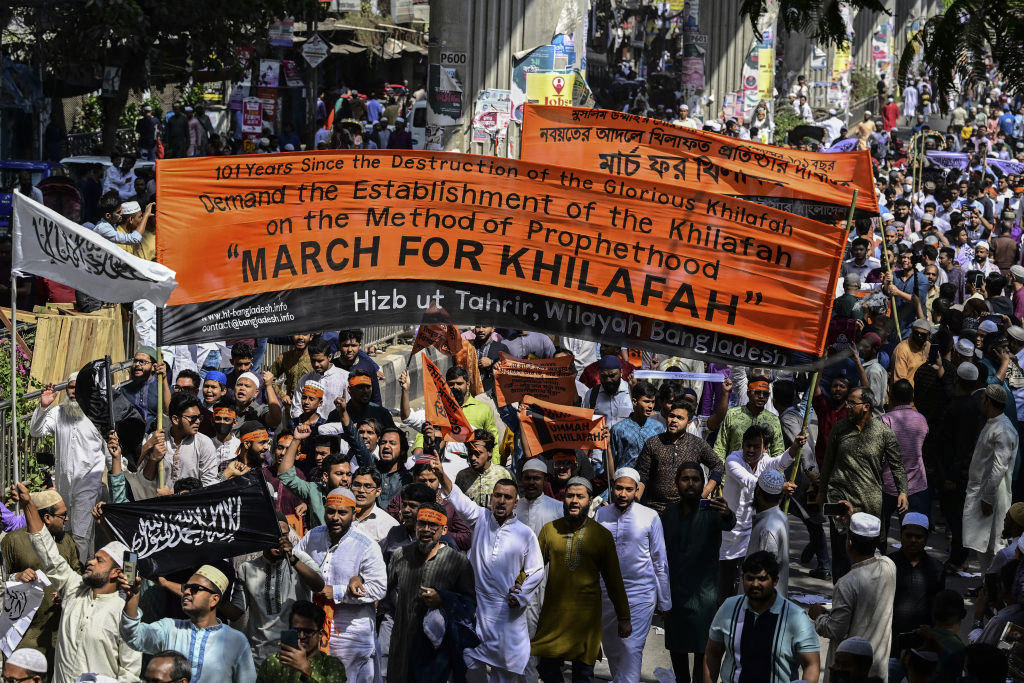
In an unprecedented escalation of Islamist persecution, Jamaat-e-Islami — the Bangladeshi ideological offshoot of the Muslim Brotherhood — has begun imposing the jizya tax on Hindus and other non-Muslims, openly declaring its intent to replace the country's secular democratic framework with Islamic sharia law. Pictured: Thousands of members of the Bangladeshi Islamist group Hizb-ut-Tahrir hold a "March For Khilafah" through the streets of Dhaka, demanding that the country's secular democracy be replaced by an Islamic caliphate, on March 7, 2025. (Photo by Munir Uz Zaman/AFP via Getty Images)
In an unprecedented escalation of Islamist persecution, Jamaat-e-Islami — the Bangladeshi ideological offshoot of the Muslim Brotherhood (MB) — has begun imposing the jizya tax on Hindus and other non-Muslims, openly declaring its intent to replace the country's secular democratic framework with Islamic sharia law. Backed by Pakistan's Inter-Services Intelligence, and linked to global jihadist networks, including Al Qaeda, Jamaat-e-Islami's move comes just months after a coup that brought Muhammad Yunus to power, triggering a rapid rise in radical Islamic influence. This development threatens not only Bangladesh's fragile democracy but also poses a strategic security risk to South Asia and the wider free world. On July 25, 2025, local media reported that Dr. Shafiqur Rahman, president of Jamaat-e-Islami Bangladesh, publicly declared that Hindus and other non-Muslims must pay the jizya tax. According to one report from July 31:
Continue Reading Article
The EU 'Elites', Part III
The EU Needs Its Own Department of Government Efficiency (DOGE)
by Robert Williams • September 4, 2025 at 5:00 am
The report ("The EU's Propaganda Machine: How the EU funds NGOs to promote itself") shows how the European Commission – the unelected executive branch of the European Union – is using taxpayer money "to promote its political agenda under the guise of advancing 'EU values'." In short, the EU is funding NGOs and think-tanks to spread its own propaganda. "Out of over 4,400 NGOs funded between 2014 and 2023, just 30 organisations received more than €3.3 billion—over 40% of the total. The EU's much-vaunted pluralism looks more like a cartel." — MCC Brussels, "EU Court of Auditors Exposes Systemic Opacity, Cronyism in NGO Funding," April 7, 2025. "These bureaucracies are funding NGOs not, you know, to feed hungry people or to advance a broadly agreed upon social agenda. It's to protect their own interests and to feather their own nests." — Peter Schweizer, author and investigative journalist, February 2025. "It's more like an extortion model, it's more like the mafia, when the mafia shows up at a corner grocery store in urban America and says 'hey you might want to take out insurance with us, because if you don't, your shop might actually burn down.' Well, in this scenario, that's the government, and government officials in the United States and also in Europe threaten and pressure corporations, you know, people who do not share their political views..." — Peter Schweizer, February 2025. That is just the NGOs. The European Commission also funds an unknown number of other projects. Perhaps the most notable among them, given the enormous amounts of money diverted to it, is the funding of the terrorist entities in the West Bank and Gaza Strip. The EU routinely boasts of being the largest provider of foreign aid to the Palestinians, although it is highly unclear how this, in any way, is in the interest of Europe's taxpayers. In December 2023, just months after the October 7 massacre by Hamas of 1,200 innocent people in Israel, the EU boasted: "The European Union is the biggest provider of external assistance to the Palestinians which amounts to indicatively almost €1.2 billion for 2021-2024 under the European Joint Strategy..." Then there are all the cases of foreign influence operations in the EU involving Qatar, and China's Huawei, as well as the corruption scandal involving Pfizer. There is the extreme lack of transparency within the European Union and its severely undemocratic decision-making processes, lack of transparency and lack of a mechanism for walking away. In April, a group of Members of European Parliament, known as Patriots for Europe, inspired by the US, actually proposed a DOGE for Europe. The initiative, however, also known as TRAC (Transparency, Responsibility, and Anti-Corruption) is facing staunch opposition from the mainstream parties in the European Parliament. Maybe they have a lot to hide?

Most Europeans are completely unaware of the madness of EU spending on useless, batty projects, including NGOs that have turned out to be a way for many of the EU's "elites" to receive nice kickbacks. (Image source: iStock/Getty Images)
The idea of a European Union Department of Government Efficiency (DOGE) to clean up the waste and fraud that goes on with EU taxpayer money is slowly spreading in Europe, but more than overdue. Most Europeans are completely unaware of the madness of EU spending on useless, batty projects, including NGOs that have turned out to be a way for many of the EU's "elites" to receive nice kickbacks. In February 2025, MCC Brussels, a European think-tank, published a bombshell report, "The EU's Propaganda Machine: How the EU funds NGOs to promote itself." The report shows how the European Commission – the unelected executive branch of the European Union – is using taxpayer money "to promote its political agenda under the guise of advancing 'EU values'." In short, the EU is funding NGOs and think-tanks to spread its own propaganda:
Continue Reading Article
by Uzay Bulut • September 3, 2025 at 5:00 am
According to the Department of Justice, in the early 1990s, the Muslim Brotherhood, planned to establish a network of organizations in the US to spread a militant Islamist message and raise money for Hamas. The Texas-based Holy Land Foundation for Relief and Development (HLF) became the chief fundraising arm for the Palestine Committee in the US, created by the MB to support Hamas. In 2008, HLF leaders were convicted of crimes, including providing material support for Hamas. "Jihad means the fighting of the unbelievers and involves all possible efforts that are necessary to dismantle the power of the enemies of Islam, including beating them, plundering their wealth, destroying their places of worship, and smashing their idols." — Muslim Brotherhood founder Hasssan al Banna, The Way of Jihad. Muslim Brotherhood-affiliated groups and networks are also exceedingly active in Europe and are richly funded by EU institutions. The question is not whether the US government should list the Muslim Brotherhood as a terrorist organization. The answer to that is clear: yes, it should. A more pressing question is why these pro-jihad, Islamic supremacist organizations affiliated with the MB have been allowed to operate on the US soil for all those years.
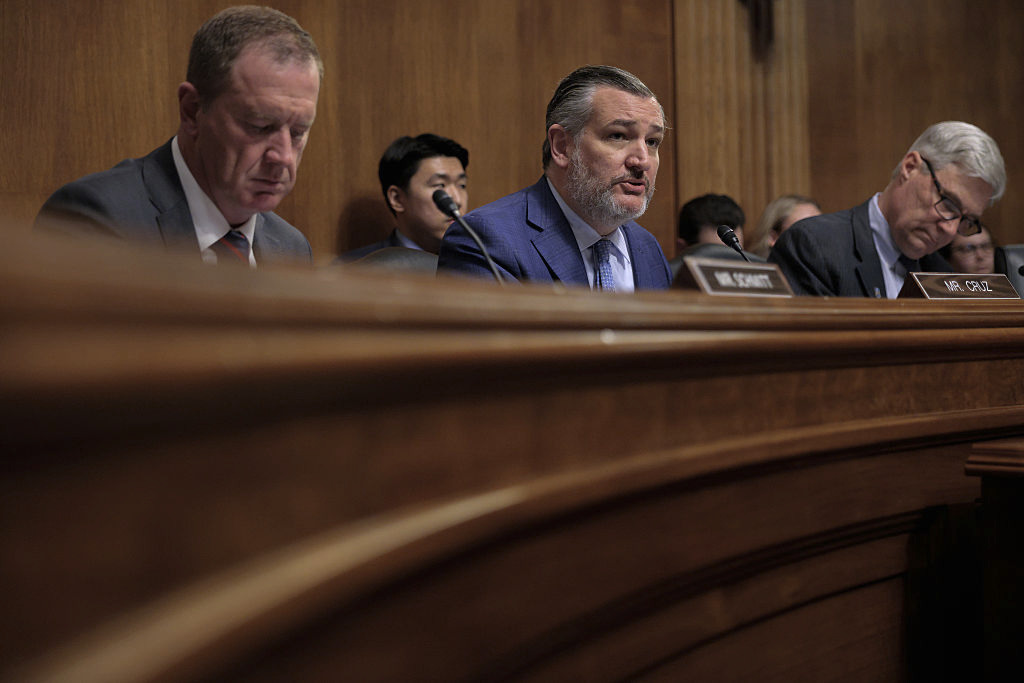
On July 16, US Senator Ted Cruz introduced the Muslim Brotherhood Terrorist Designation Act of 2025, which would implement a new, modernized strategy for designating the Muslim Brotherhood (MB) as a terrorist group. The question is not whether the US should list the MB as a terrorist organization. The answer to that is clear: yes. A more pressing question is why these pro-jihad, Islamic supremacist organizations affiliated with the MB have been allowed to operate on the US soil for all those years. Pictured: Cruz speaks at a Senate Judiciary Committee subcommittee hearing on Capitol Hill on June 3, 2025. (Photo by Chip Somodevilla/Getty Images)
US Senator Ted Cruz, Chairman of the Senate Foreign Relations Subcommittee on Africa and Global Health Policy, on July 16 introduced the Muslim Brotherhood Terrorist Designation Act of 2025. This bill implements a new, modernized strategy for designating the Muslim Brotherhood (MB) as a terrorist group. Cruz said:
Continue Reading Article
by Khaled Abu Toameh • September 2, 2025 at 5:00 am
It was Qatar, in fact, during the entire Trump administration's supposed "mediation," that repeatedly instructed Hamas to keep attacking Israel and not to disarm. Even after joining the Arab League's request for a ceasefire, Qatari government journalists are urging Hamas to kidnap more Israeli soldiers, to "[f]ight the Jews and kill them," and that "Jihad victory in Gaza will end Zionism." After the January 2025 ceasefire came into effect, Qatar's government media called the ceasefire a "crushing historic victory" for Hamas, a "significant defeat" for Israel, and like the Treaty of Hudaybiyyah, "which the Prophet Muhammad signed with his enemies in the Quraysh tribe" for ten years, but "which he violated after approximately two years," and proceeded to conquer Mecca. If 22 Arab and Muslim countries do not have the courage to speak out against Hamas, how can they be expected to play any role in ending the war in the Gaza Strip? Qatar has so far failed to pressure the terror group [Hamas] to lay down its weapons and relinquish control over the Gaza Strip. Qatar's government journalists, as noted, are still actively encouraging Hamas to continue the war. If the two countries [Egypt and Qatar] really wanted to pressure Hamas, they would at least threaten to deport the terror group's leaders and their families and seize their bank accounts. Not only has this not happened, but Hamas leaders continue to lead comfortable lives in Doha and are warmly received each time they fly to Egypt. Hamas leaders simply feel no pressure whatsoever from the Arabs to end the war in the Gaza Strip. That is most likely why Hamas leaders are determined to fight to the last Palestinian. From their safe homes and offices in Qatar and Turkey, Hamas leaders continue to glorify the Palestinian "resistance" and threaten Israel with more terrorism. The fastest way to end the war is by demanding -- with consequences for dawdling -- that the Arab countries, especially Egypt and Qatar, take a truly tough stance against Hamas. The Trump administration is probably the only party that can pressure Egypt and Qatar to force Hamas to release the hostages and lay down its weapons.
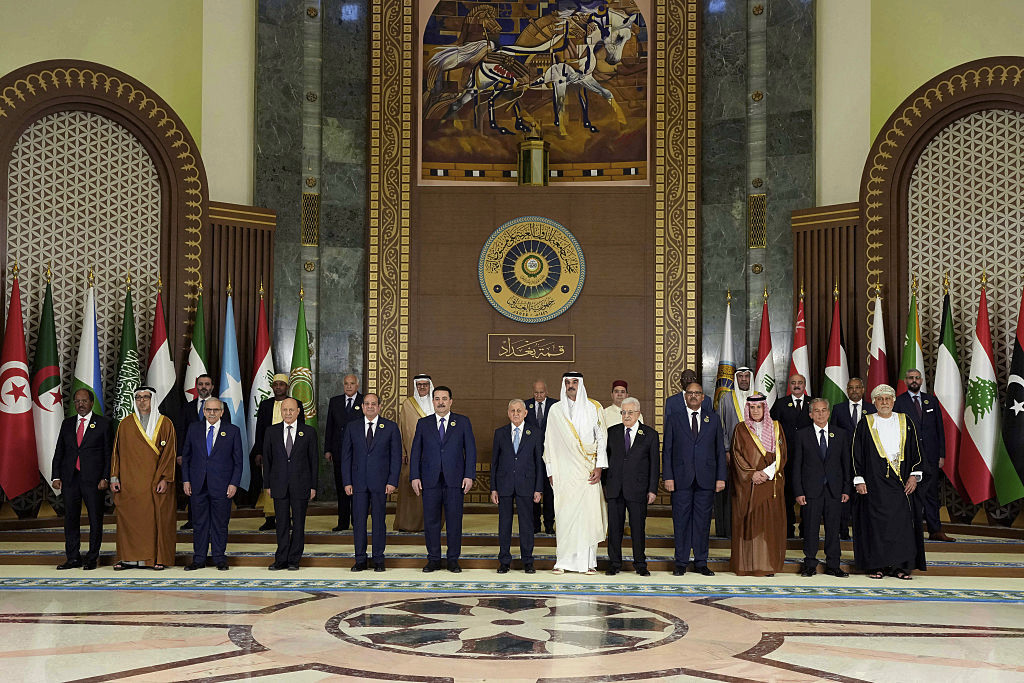
Like the rest of the Arab countries, Egypt and Qatar do not appear especially put out by Hamas's refusal to heed the call of the Arab League. Hamas leaders simply feel no pressure whatsoever from the Arabs to end the war in the Gaza Strip. That is most likely why Hamas leaders are determined to fight to the last Palestinian. Pictured: Arab heads of state at the 34th Arab League summit in Baghdad on May 17, 2025. (Photo by Hadi Mizban/Pool/AFP via Getty Images)
In an unprecedented move, the Arab League, which represents 22 Arab countries, on July 30, called on the Iran-backed Palestinian group Hamas to lay down its weapons and relinquish control of the Gaza Strip. Hamas rejected the call. How did the Arab countries respond to Hamas's rejecting their request? Instead of calling out Hamas for causing death and destruction in the Gaza Strip, they condemned Israel. Earlier this year, a senior Arab League official, Hossam Zaki, was quoted as saying that it would be in the interests of the Palestinian people if Hamas ceded control of the Gaza Strip. As usual, Hamas rejected the call. Since then -- and before -- the Arab League has repeatedly denounced Israel for fighting against the terror group responsible for the October 7, 2023 invasion of Israel, the worst crime against Jews since the 1940s.
Continue Reading Article
by Lawrence Kadish • September 2, 2025 at 4:00 am
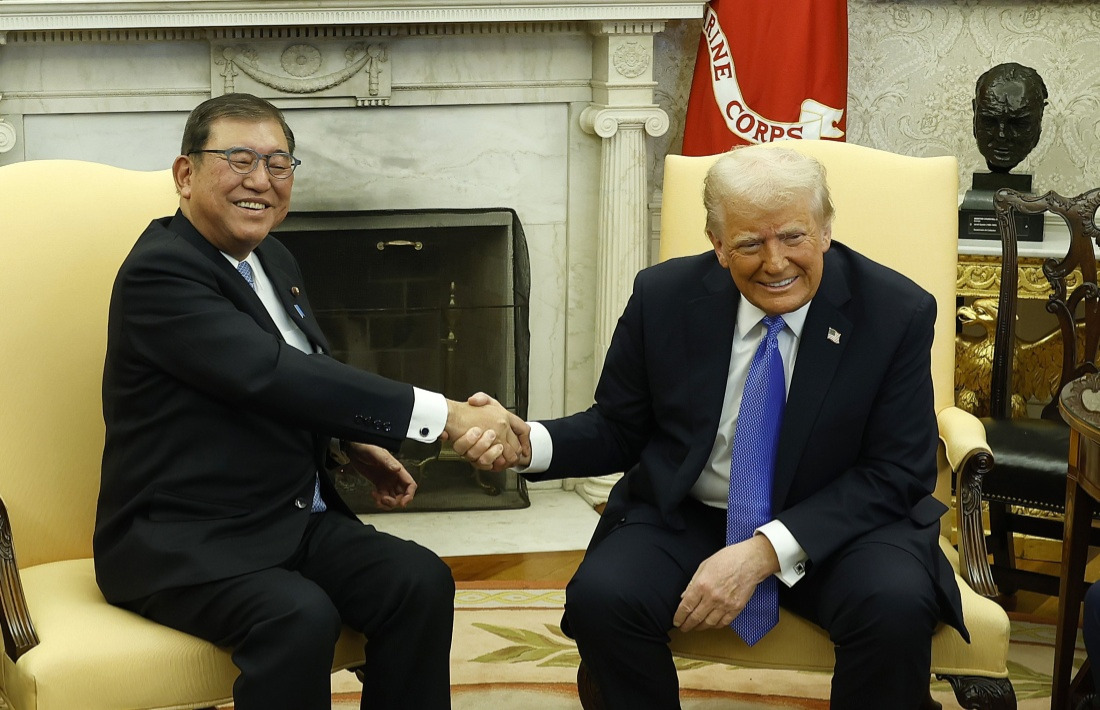
Japan and America, once bitter enemies that gave no quarter, are now, 80 years later, staunch allies in the defense of democracy. Pictured: U.S. President Donald Trump shakes hands with Japanese Prime Minister Shigeru Ishiba in the White House on February 7, 2025 in Washington, DC. (Photo by Anna Moneymaker/Getty Images)
The Museum of American Armor on Long Island observed the 80th anniversary of the end of World War II this week, creating what is an extraordinary, and perhaps historic, milestone. Against a backdrop of World War II armor, three Shinto priests arrived from Japan, where they were joined by a local rabbi and priest to offer prayers and reflection on a war in the Pacific that took the lives of millions and was characterized by a ferocity that even now shakes one's soul. Yet the underlying message at the Armor Museum's event was the fact that two nations, once bitter enemies that gave no quarter, are now, 80 years later, staunch allies in the defense of democracy. The anniversary comes at a time when Japanese Prime Minister Shigeru Ishiba did something quite extraordinary for his nation. According to Japan's daily Asahi Shimbun, he invoked the word "remorse" in remarks observing this 80th anniversary.
Continue Reading Article
|

















